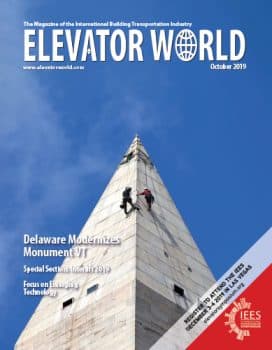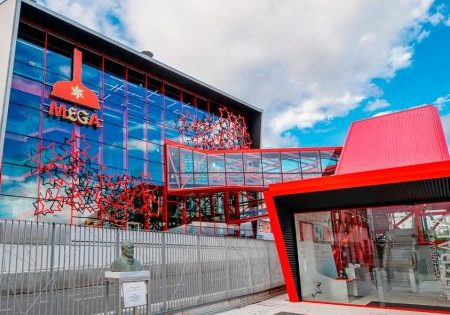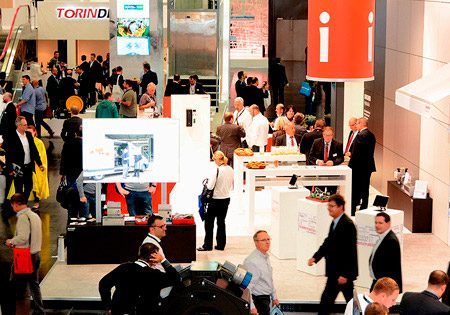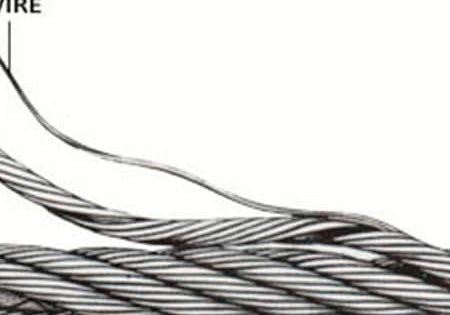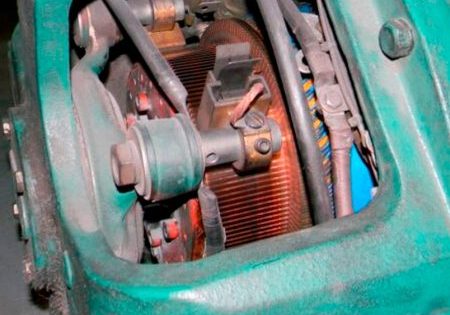Future Ready
Oct 1, 2019
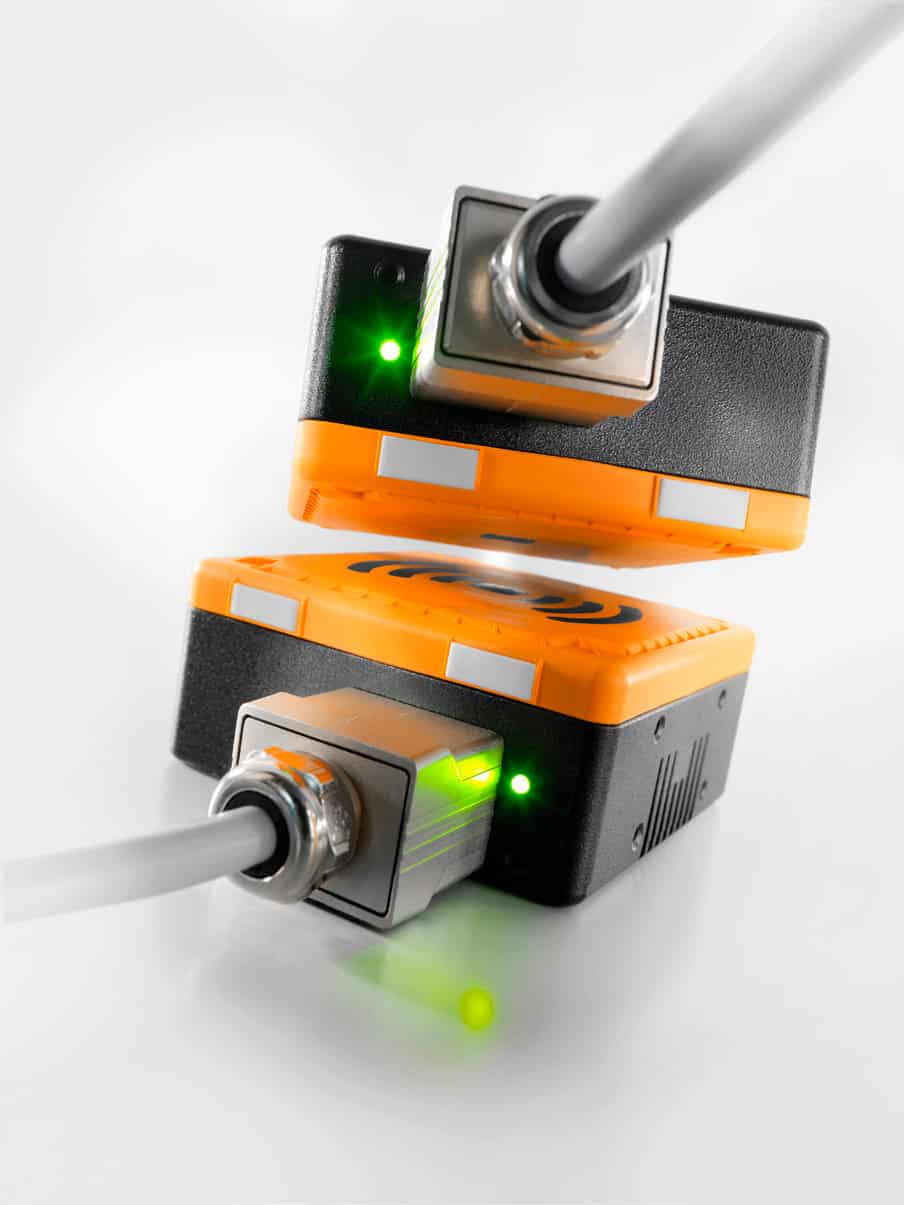
Interlift prompts the announcement of a variety of new products.
Contactless Power Transmitter
Weidmüller has added the FreeCon Contactless to its customized elevator products. It is called “a maintenance-free power transmission solution” that allows contactless charging of up to 240 W in cars. With a fast cellular network in the shaft (instead of traveling cable) enabling data transmission in the future, this product will allow the charging of a battery in the car in a “futureproof ” way, the company says. By means of inductive resonance coupling, the product transmits power over an air gap, precluding contact-related failures.
Luminous Panels for Cabs
Hansen GmbH of Haselund, Germany, offers its Luminous Panel for the homogeneous illumination of large surface areas. It is most frequently used for backlighting ceilings and walls in elevator cars. Its depth is only 8, 11 or 13 mm, and it is glare free. The company also recommends its use for advertising spaces and information boards in elevators.
A similar product, the all-custom Frameless Luminous Panel, is designed to help complete completely luminous walls or niche lighting. It has an overall depth of 21 mm and can be supplied with single-color LEDs, continuously dimmable mixed white LEDs or color-changing RGM LEDs. Suitable smart radio remote controls are also available.
Rapid, Detailed Elevator Planning
The DigiPara Liftdesigner Cloud permits rapid elevator planning using manufacturer-provided building information modeling (BIM) components. With greater architect demand for 3D BIM models of elevators, the new platform can help by directly using suitable components in elevator planning and construction. It uses different levels of development (LODs) and levels of information (LOIs) instead of static computer-aided-design files in the STEP format. STEP models cannot be configured by the user and contain no LOI data.
In the new platform, manufacturers upload their current 3D BIM data to the Liftdesigner Cloud and grant access to all elevator planners and builders around the world. LOIs in the BIM data, such as main features, item numbers and technical documentation, are automatically added all the way into the final elevator model for the architects. Predefined and automatic LODs provide additional support to simplified models for quick preliminary planning. The component features can be edited at any time, and a complete 3D BIM model can be exported to the IFC 4.0 format.
Safety Security System and Field Box
Schmersal’s integrated safety solution is designed to offer a high level of safety, higher machine availability and significant savings potential. The AZM400 security system is characterized by a high holding force of 10,000 N. Due to the two-channel unlock signal, it reaches the power values needed for compliance with PLe/Category 5 (ISO 13849) and SIL 3 (IEC 61508) for both its interlocking and guard-locking functions. New accessories for it include locking pliers to protect operating personnel from being mistakenly included during maintenance and repair work in the case of larger, walk-in machines and systems. For this purpose, service staff attaches a lock to the locking pliers when entering the danger zone so that the door of the protective device cannot be closed. This prevents unintentional startup of the machine. The locking pliers can be installed either inside or outside the danger zone. Up to six locks can be attached to them, allowing up to six people in the danger zone at the same time.
In combination with the new Safety Fieldbox, Several AZM400s can be connected in a safety chain to a PROFINET/ PROFIsafe node to greatly reduce costs. The Safety Fieldbox has a universal interface with an eight-pin M12 connector. It can connect a wide range of different safety switchgears: safety guards, switches, sensors, light curtains and control panels. Both electronic and electromechanical safety devices occupy only one device connection at a time. The advantage for the user is significantly simplified and, thus, more cost-effective safety switchgear wiring. In addition, complex additional installations for controlling the locking and reading back of the diagnostic information are avoided.
An additional digital input on the Safety Fieldbox contributes to higher machine availability: the diagnostic signals of all connected safety switchgears are transmitted to the controller via this digital input. It provides the user with status information about the locking and error messages for evaluation; e.g., the user receives the notification to readjust the protective door in case of door offset. This means machine downtimes can be avoided by applying preventive maintenance.
Roller Sets With High-Tech Lining
Elastomer-Technik Nürnberg GmbH (ETN) of Kalchreuth, Germany, offers roller guides with Vulkollan® (VU) lining. The company calls the lining “an extremely elastic polyurethane.” This elastomer is designed for resilience and durability and adds a high load-bearing capacity. The lining’s hardness makes guides on which it is applied compensate well for rail irregularities and offset any roughness. ETN offers static roller guides FK for lift cars, GG for counterweights, plus special RS versions for backpack/L-frame roller guides. They include precision ball bearings, and their diameters and widths can be adjusted for almost any requirement.
ETN also says its holders have oblong holes that allow easy adjustment of the rollers. Contrary to the otherwise common practice of using excenters, ETN’s rollers are strictly parallel to each other. Since the rollers are pressed onto the rail by hand, the linings cannot be crushed, which the company says prevents wear.
Guides With Elastic Springs
ETN’s guides with elastic springs are: RFG (spring-loaded roller guides), RFGK (small spring-loaded roller guides), RFGW (spring-loaded elbow roller guides) and TRF (tandem roller guides). The company says these boost the comfort of all conveyor systems and compensate for rail jolts and unevenness, as well as unintended vibrations. A prerequisite for them is a centrally suspended lift. The TRF version is designed for comfort under fast speeds up 8 m/s. ETN suggests they are good for use in hospitals, hotels, administrative and concert buildings and high rises.
ETN adds that it makes exclusive use of springs-per-roller made of an elastic intermediate layer, consisting of cellular or homogeneous Vulkollan® (or a combination of both). These mountings do not cause additional vibrations or reverberation, unlike those using steel springs. Additional tools are not needed for their adjustment, and each roller can be adjusted individually.
Get more of Elevator World. Sign up for our free e-newsletter.

